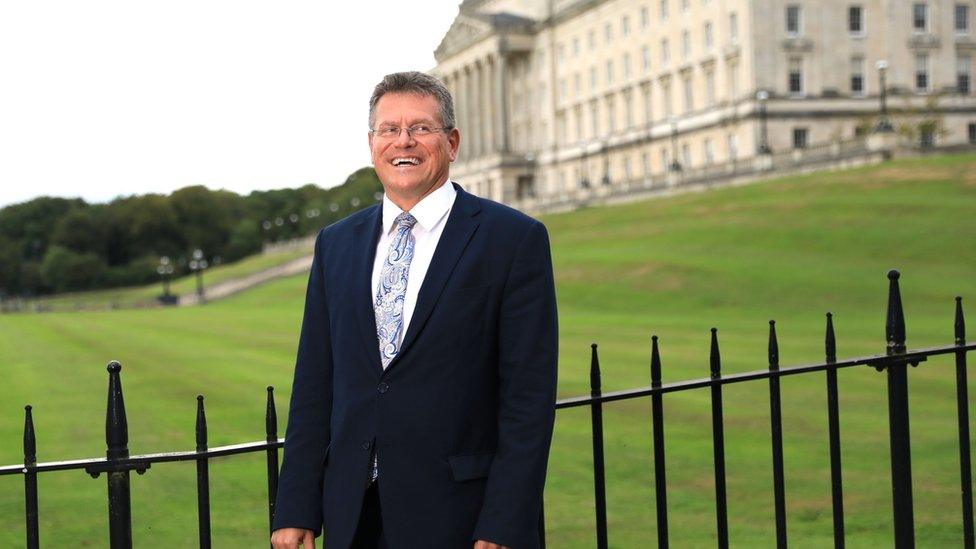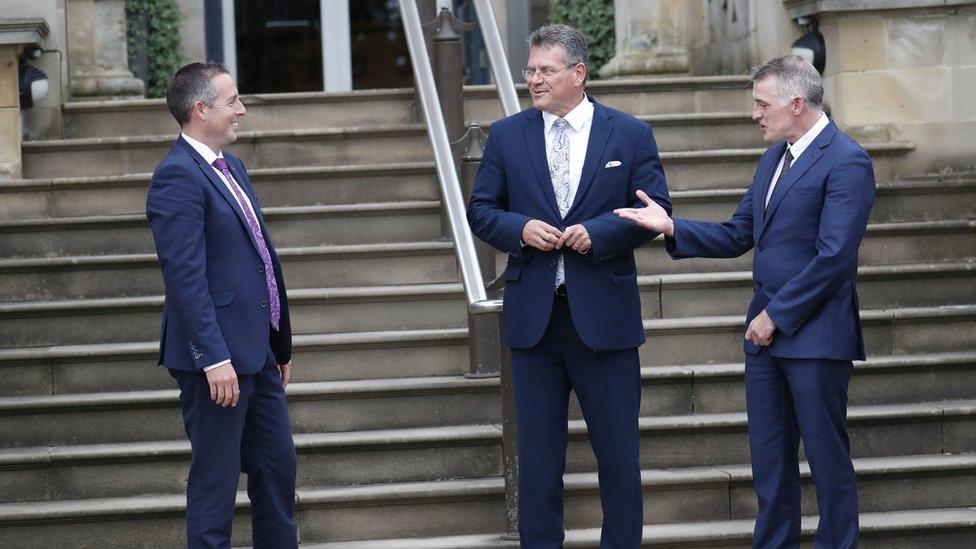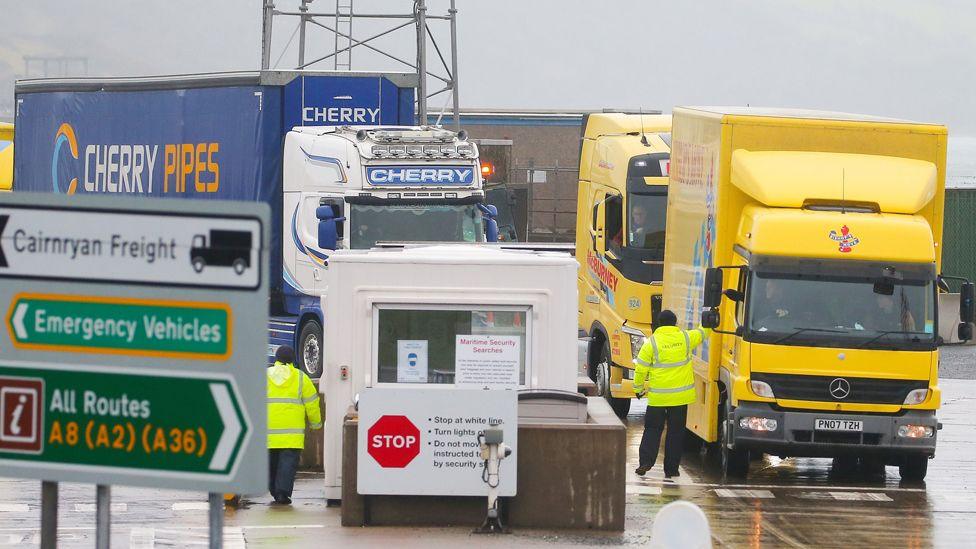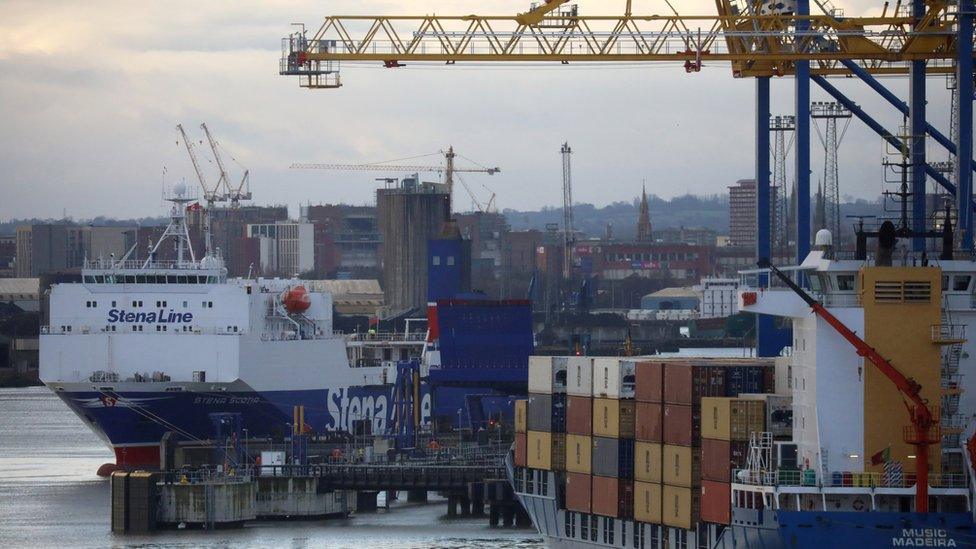Brexit: Maros Sefcovic urges politicians to 'dial down' NI Protocol rhetoric
- Published
- comments

Maros Sefcovic is in Northern Ireland to meet political, business and civic leaders
European Commission vice president Maros Sefcovic has urged politicians to "dial down the rhetoric" on the Northern Ireland Protocol.
He was responding to Sir Jeffrey Donaldson's warning that his party may quit Stormont "within weeks" if its protocol demands are not met.
Mr Sefcovic is in Northern Ireland to meet political, business and civic leaders.
The UK wants the protocol, which puts a trade border in the Irish Sea, changed.
Unionists believe it undermines their place in the United Kingdom and want it to be scrapped.
Mr Sefcovic said he had already spoken to Sir Jeffrey "a couple of weeks ago".
"I will see him this afternoon as I will see also the other political leaders," he said on Thursday.
"We will have the opportunity to discuss this face to face and my message will be 'let's work on the concrete problems'.
"Let's focus on the issues which are the most important for the people of Northern Ireland, let's be constructive, let's dial down the political rhetoric, let's bring calm and focus on what is our task to accomplish."
Mr Sefcovic, the EU's chief Brexit negotiator, described Sir Jeffrey as a "very experienced politician" who wants the best for Northern Ireland.
"I can assure him that is my intention as well," Mr Sefcovic added.

Mr Sefcovic (centre) met First Minister Paul Givan (left) and Declan Kearney, junior minister at the Executive Office during a visit to Stormont
Mr Sefcovic said the purpose of his trip to Northern Ireland was to find out "face-to-face" what the problems were with the implementation of the protocol.
Allow X content?
This article contains content provided by X. We ask for your permission before anything is loaded, as they may be using cookies and other technologies. You may want to read X’s cookie policy, external and privacy policy, external before accepting. To view this content choose ‘accept and continue’.

"I came here to listen, to learn what are the concrete problems that the people of Northern Ireland are facing with the implementation of the protocol.
"But I am also here to talk about opportunities the protocol is bringing, especially to the economy and of course the people of Northern Ireland, and I am starting with the business representatives."
'Taking note'
On Monday, the UK delayed new checks on goods from Great Britain entering Northern Ireland as required by the protocol.
Lord Frost, the Brexit minister, said the move was necessary to "provide space for further potential discussions" with the EU.
Mr Sefcovic said the EU had taken note of the decision.
"We are talking over the last few weeks constructively on solving the issues linked with the protocol and I hope that also the way that we handled Monday's announcement coming from London just proves that we are ready to do our utmost to look for every possible solution within the protocol to resolve the problems."
However the EU has repeatedly said the sort of fundamental renegotiation Lord Frost wants is not on offer.


Technical discussions between the UK and EU on an agri-food agreement have reached a stalemate.
The EU has offered the UK a Swiss-style deal which would involve the UK following EU rules.
The UK has rejected that and instead asked for a deal in which the EU would recognise UK standards as equivalent to its own.
An EU official has suggested that the issue could be unlocked with a bespoke arrangement which recognises Northern Ireland's unique circumstances.
It is not yet clear what such an arrangement might involve and the EU is wary that the UK would demand the same deal for GB-EU agri-food trade.
Related topics
- Published31 August 2021

- Published6 September 2021
